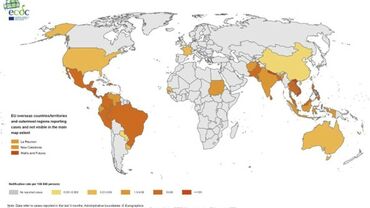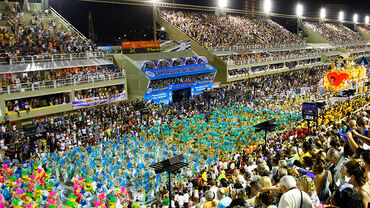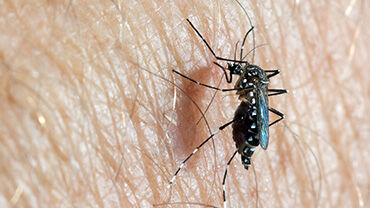Epidemiological update: No local transmission of dengue virus in Greece, 4 October 2012Archived
The dengue case reported in the epidemiological update of 7 September has now been discarded based on additional laboratory results.
The Dengue case reported in the epidemiological update of 7 September has now been discarded based on additional laboratory results.
On 3 August 2012, Greece reported a probable case of dengue infection in a resident in west Greece (Agrinio). This case was classified as a probable dengue case due to the presence of a high titre of IgM dengue antibodies in a serum sample which would indicate an acute infection. In addition, dengue NS1 antigen was detected in serum with PCR, but detection of dengue nucleic acid tests was negative.
Additional laboratory investigations have now discarded this case as a dengue infection. This has been concluded as a rare occurrence of a cross-reaction with murine monoclonal antibodies used in both the IgM antibodies and NS1 antigen testing kits.
In the context of the response to the possible case, the Hellenic Centre for Disease Control (KEELPNO) performed epidemiological and entomological investigations.
The epidemiological investigation included active retrospective and prospective case finding, review of compatible cases, and a survey of people living within a 200m radius of the case and the patient’s relatives. A total of 132 patients were examined. Ten reported compatible symptoms (such as fever, headache, arthralgias/myalgias, nausea, vomiting or Upper Respiratory Infection in the last 15 days) but all tested negative for IgM and IgG antibodies for dengue virus.Two entomological missions were organized in the geographical area of possible infection, to investigate the presence of competent dengue virus vectors. Aedes albopictus adults were captured but tested negative for dengue virus.
Dengue is a mosquito-borne disease caused by any one of the four types of dengue virus. Most infections occur in tropical regions with an estimated 50 to 100 million infections annually in 125 countries. There is no direct person-to-person transmission. The main vector of dengue worldwide, the Aedes aegypti mosquito, is not present in Greece. Aedes albopictus, an effective secondary mosquito vector known to cause outbreaks, has been present in western Greece since at least 2003.
Dengue infections are rare in Europe and most cases are imported as a result of infection in tropical areas. Local transmission of dengue virus is extremely rare in Europe. The last recorded local transmission of dengue in Greece was during an outbreak in 1927 – 1928, involving the Aedes aegypti mosquito. In 2010, autochthonous cases of dengue were reported in France and Croatia in areas infested by Aedes albopictus.







